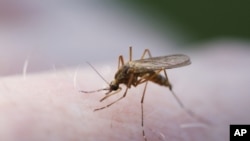With a promising new anti-malaria vaccine in its final stage of testing, researchers around the world are optimistic they are finally making progress toward ending the deadly disease. But, the disease and the effort to find a cure have come at a cost.
Africa loses an estimated one percent of its gross domestic product to malaria every year. The continent is also home to most of the nearly one-million annual deaths attributed to the mosquito-borne illness, the majority of them children younger than five. Because of this, researchers have worked to develop a vaccine specifically for use against the African strain of the virus
The researchers working on the vaccine, called RTS-S, announced earlier this month the drug would be the first of its kind to enter phase III testing, the last stage of clinical trials a vaccine must pass before it can be used in the general population. Some say this development should have come earlier.
Long-time VOA Africa Correspondent Nico Colombant, a three-time malaria survivor, says he believes the virus has not historically received the research deserved because of the places it affects.
"Malaria is clearly a disease that exists in poorer countries, so you do not have the same incentive for pharmaceutical companies to make a drug that is effective because the profit margin is much lower," said Nico Colombant.
World Health Organization medical officer Vasee Moorthy agrees, noting most research funding for the vaccine has come from international donors and non-profit organizations.
"It is certainly true to say the market for a malaria vaccine is not as strong or robust as it would be for a vaccine that you could market in high-income countries," said Vasee Moorthy.
Moorthy adds that, though RTS-S has so far proven effective at preventing the disease in an unprecedented half of those vaccinated, the immunization will likely be only one part of multi-pronged effort to eliminate the illness.
"A vaccine, we would see as one element of a coordinated malaria control program, and it will be for countries to determine how any new vaccine would fit in with all of the existing malaria control measures, which would continue to have an absolutely vital role," said Moorthy.
He says interventions currently available, such as bed nets and drug therapies, could be more effective in helping to eradicate the disease when combined with the use of a vaccine.
A health specialist with UNICEF's Malaria Partnerships, Valentina Buj, says ending malaria would have major socio-economic effects for Africa. She says that now, even when malaria cases are not deadly, the disease can easily drain the financial resources of low-income families.
"If you have a child who's sick with malaria, you have to spend time taking care of them, it takes household resources to buy treatment, to buy prevention, to take care of your children, not to mention, of course, the psychological effects should you lose a child to malaria," said Valentina Buj. "Then, of course, when an adult is affected by malaria, it is absenteeism from work, not just for the person who is ill but also for the caretaker."
Additionally, Buj says the virus can keep kids out of school for weeks at a time, setting them back in their studies and, in turn, further harming the future of affected countries.
Although some preventive measures are available, many families struggle to pay for them. That is why the WHO's Moorthy says the success of a future vaccine depends on its price.
"No significant coverage in malaria endemic countries, certainly in highly malaria endemic countries, is likely if the parents of a child would have to make any significant contribution to the price of the malaria vaccine," he said.
But Malaria Vaccine Initiative Preclinical Research and Development Director Ashley Birkett says families will not have to bear the charges.
"The burden of costs for purchase of these vaccines is not going to fall on parents of the children who need these vaccines," said Ashley Birkett.
He says various national and international groups will evaluate helping local governments fund RTS-S, should the drug pass the latest round of testing.
Results are showing the vaccine prevents severe disease and death for 50 percent of trial participants, though the duration of the positive effects is unknown.
Phase III testing for the malaria vaccine is ongoing at 11 sites across seven African countries. If RTS-S survives the trial, it could be available as soon as 2012.
News
Researchers, Aid Groups Optimistic About Malaria Fight
update




